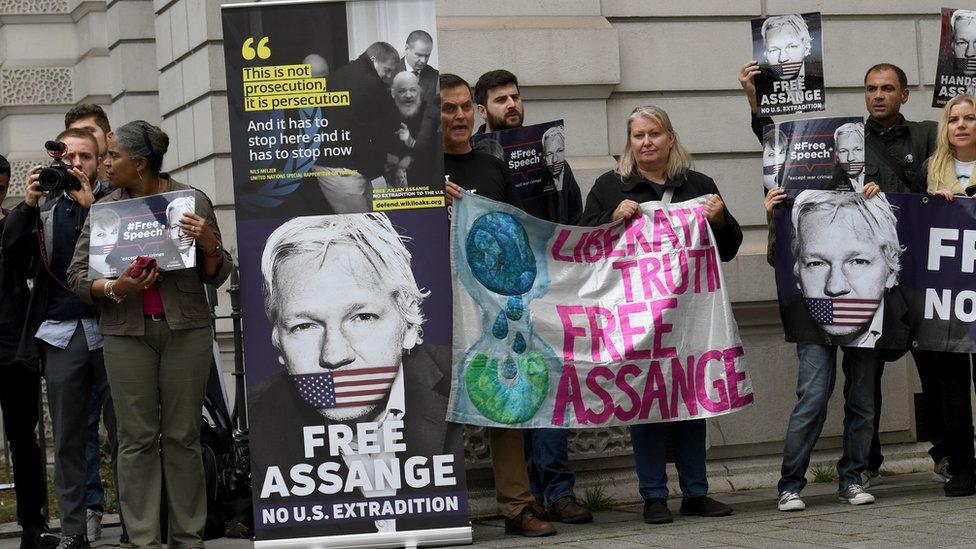Julian Assange extradition case 'outrageous assault on journalism'
- Published

Julian Assange is fighting extradition to the US
Julian Assange's legal team have branded the US extradition case against him "an outrageous and full-frontal assault on journalistic rights", as a court ordered him to face a full extradition hearing next year.
The WikiLeaks founder is fighting being sent to the US to face charges related to the leaking of government secrets.
The case was opened at Westminster Magistrates' Court on Friday.
It came after an extradition request was signed by the home secretary.
By certifying the request on Thursday, Sajid Javid allowed it to be considered by the court.
Chief Magistrate Emma Arbuthnot ordered for a full extradition hearing, expected to last five days, to begin on 25 February 2020.
Assange, 47, told Westminster magistrates via video link that "175 years of my life is effectively at stake" and defended his website against hacking claims, saying: "WikiLeaks is nothing but a publisher".
Mark Summers QC, representing Assange, told the court there were a "multiplicity of profound issues" with the extradition case.
But Ben Brandon, representing the US, said the case relates to "one of the largest compromises of confidential information in the history of the United States".
Evidence will show that Assange "first encouraged" former US army intelligence analyst Chelsea Manning to illegally obtain documents, then agreed with her to "crack" a password on a Pentagon computer, Mr Brandon alleged.
The documents relate to the Iraq and Afghanistan wars and information on secret intelligence sources, he said.
"By publishing that unredacted material on the internet, Mr Assange created a grave and imminent risk that human intelligence sources, including journalists, human rights defenders and political activists, would suffer serious physical harm or arbitrary detention," Mr Brandon said.

A group of protesters gathered outside the court in support of Assange
Speaking outside the court after the hearing, Jennifer Robinson, a lawyer representing Assange, warned the US indictment would "place a chilling impact" on journalism and publishers "all over the world".
She said the US was seeking Assange's extradition for publishing "truthful information about the United States", including "evidence of war crimes, human rights abuse and corruption the world over".
The Wikileaks founder faces 18 charges in the US, including computer misuse and the unauthorised disclosure of national defence information.
At his last hearing a fortnight ago Assange was too ill to appear in court, according to his lawyer.
Who is Julian Assange?
Assange is currently serving a 50-week sentence in Belmarsh Prison in south-east London for bail violations after taking refuge in the Ecuadorian Embassy in a bid to avoid extradition to Sweden to face rape allegations in 2012.
Following Friday's hearing, officials at Southwark Crown Court, where Assange was jailed for a bail breach, confirmed an appeal had been lodged against the sentence.
He spent seven years inside the Ecuadorian embassy in London before being handed over to British authorities by Ecuador in April.
Last month, Swedish prosecutors reopened their investigation into an allegation of rape against Assange, which he denies.
- Published13 June 2019

- Published26 June 2024

- Published25 June 2024
